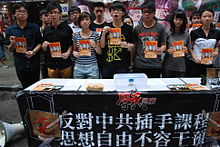
The Hong Kong 1 July protests was an annual protest rally originally held by the Civil Human Rights Front from the day of handover in 1997 on the HKSAR establishment day. However, it was not until 2003 that the march drew large public attention by opposing the legislation of Basic Law Article 23. The 2003 protest, with 500,000 marchers, was the second-largest protest seen in Hong Kong since the 1997 handover.

The Civil Human Rights Front (CHRF) was an organisation that focused on the issues of Hong Kong politics and livelihood, affiliated with almost all pan-democratic camps in Hong Kong. It was founded on 13 September 2002 and disbanded on 15 August 2021.

YMCA of Hong Kong Christian College, abbreviated as YHKCC, is a secondary school located at Tung Chung, Lantau Island, Hong Kong operated under the Direct Subsidy Scheme (DSS) of the Education Bureau. It is the first secondary school sponsored by the YMCA of Hong Kong.

The 2012 Hong Kong Legislative Council election was held on 9 September 2012 for the 5th Legislative Council (LegCo) since the establishment of the Hong Kong Special Administrative Region.

The British School of Beijing (北京英国学校) is a private school for children of foreign personnel in Beijing, China.

Eddie Ng Hak-kim GBS, JP is a former Secretary for Education in the Hong Kong Government. From 2017, he is a temporary adjunct professor at the MBA Centre of Shanghai University.
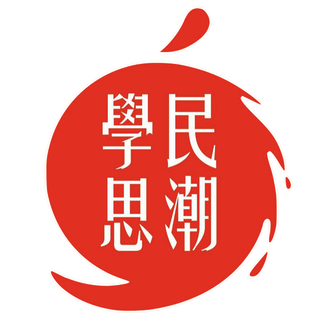
Scholarism was a Hong Kong pro-democracy student activist group active in the fields of Hong Kong's education policy, political reform and youth policy. It was reported to have 200 members in May 2015.

Secondary education in Taiwan refers to the Taiwanese education system in junior high school and senior high school. Junior high school education is compulsory in Taiwan. Children and youths aged 6 to 15 are required to receive nine years of compulsory education. By law, every pupil who completed his or her primary education must attend a junior high school for at least three years, with exemptions to homeschooling and severe disorder or disabilities. Legal guardians of offenders may be subjected to fines up to NT$300, where penalties may be repeatedly imposed until offenders return to school.
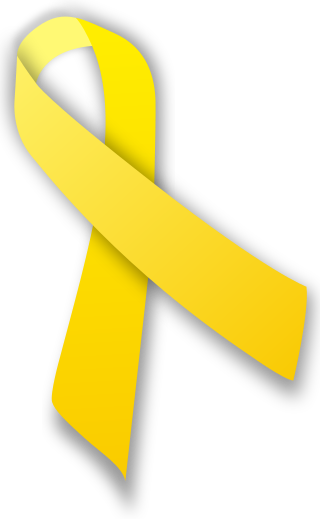
The 2014 Hong Kong class boycott campaign, also known as 922 Class Boycott and 926 Class Boycott, is a student strike protesting the PRC Standing Committee of the National People's Congress's restriction on nomination system of the election of the Chief Executive in the 2016 and 2017 Hong Kong Political Reform. The campaign, jointly organised by the Hong Kong Federation of Students and Scholarism, was participated in by university students from 22 to 26 September and later also by secondary school students on 26 September. The student movement evolved into the 2014 Hong Kong protests in which several regions across the Victoria Harbour were occupied by pro-democracy protesters.

The East Wing Forecourt of the Central Government Office, or Civic Square, is an open space in front of the East Wing of the Central Government Complex, Hong Kong, which is located in Tamar. It was once an area where protesters took part in protests and demonstrations. It was closed in July 2014, and reopened on 10 September 2014. For many, it represents democracy and freedom, and a place to express their discontent. It was occupied for a rally opposing the moral and national education school curriculum proposal in August 2012, and during the 2014 Hong Kong protests in September 2014. Since then, the square is closed by the government in order to prevent protests.

Leticia Lee See-yin was an outspoken pro-Beijing figure in Hong Kong. She held several positions at various political and activist organisations in Hong Kong.

The Kaohsiung Japanese School is a Japanese international school on the campus of Kaohsiung Municipal Lingya District Jhong-Jheng Elementary School in Lingya District, Kaohsiung, Taiwan in the Republic of China.
Paul Yip Kwok-wah is the founder and chairman of the Hong Kong Policy Research Institute, chairman of the B & P Foundation, honorary professor of Xi’an Jiaotong University, honorary professor of Graduate School of Chinese Academy of Social Sciences, as well as honorary professor of Shandong Youth University of Political Science.
The enactment of the Hong Kong national security law on 30 June 2020 has since caused huge changes in Hong Kong’s local education, government, culture, society, and economy. These effects are considered to be the result of the Hong Kong government’s continuing autocratization.
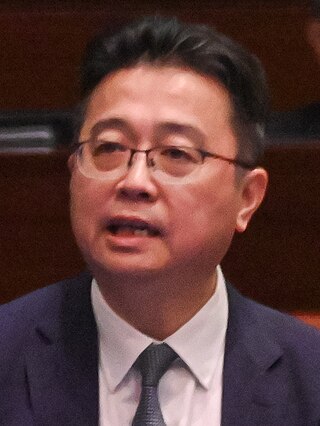
Lau Chi-pang, is a Hong Kong politician and academic serving as an Associate Vice President of the Lingnan University. In 2021, he was elected as one of the 40 Legislative Council members for the Election Committee constituency which was newly created under the electoral overhaul imposed by Beijing.
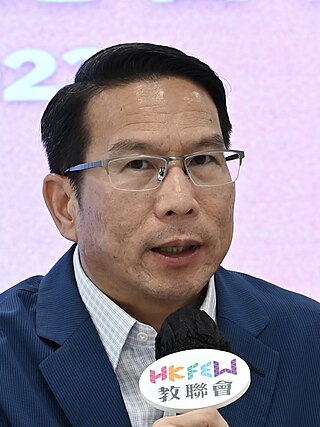
Chu Kwok-keung is a Hong Kong teacher and pro-Beijing politician, elected as a member of Legislative Council in 2021.

Halina Poon Suk-han is a Hong Kong educational worker, currently serving as a member of the Election Committee, which is responsible for electing the Chief Executive.

2030 Bilingual Nation is a policy in the Republic of China (Taiwan) promulgated by the Tsai Ing-wen administration in 2017. Its goal is to make English and another language the primary languages in Taiwanese society by 2030. In 2014, the then-mayor of Tainan city Lai Ching-te launched a ten-year plan entitled "English as the second official language" (英語為第二官方語言) to transform Tainan into a bilingual city by 2024. Lai Ching-te further promoted the national bilingual policy after taking over as premier of the Executive Yuan in 2017 and being elected as vice president of Tsai Ing-wen in 2020. Tsai Ing-wen repeatedly mentioned the goal of being a bilingual country by 2030 in her presidential inaugural address. Currently, a budget of more than NT$10 billion has been allocated to implement this policy.

Christine Choi Yuk-lin, is the current Secretary for Education in Hong Kong, formerly the principal of Fukien Secondary School and vice-chairlady of Hong Kong Federation of Education Workers.

